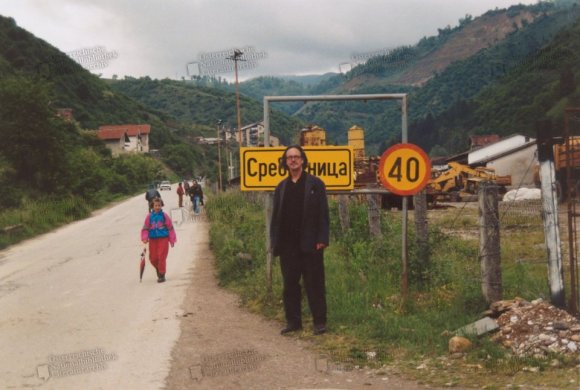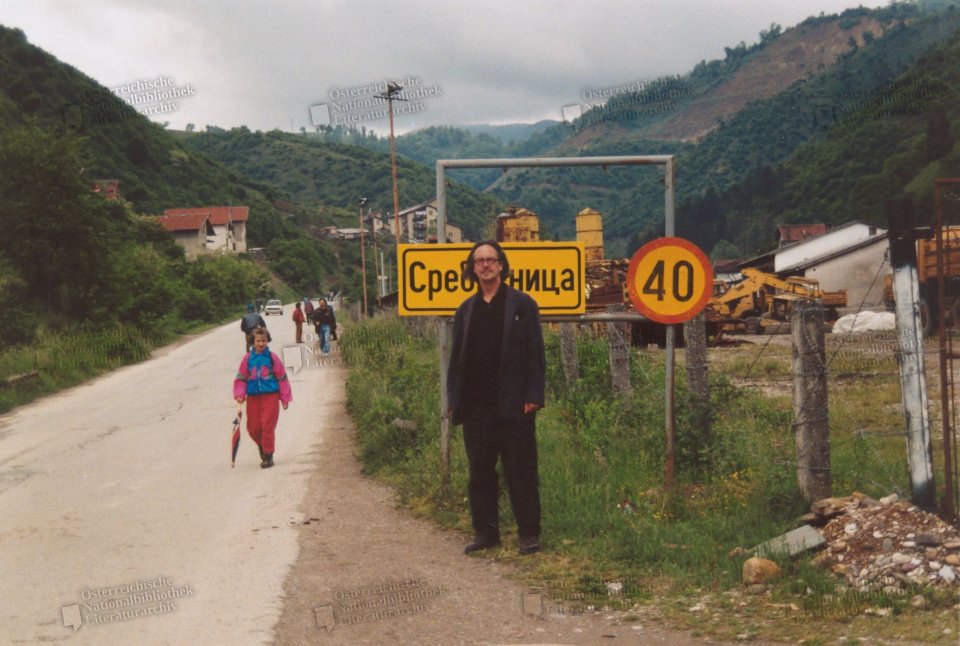 When Peter Handke got the Nobel prize for literature, reaction was immediate. Večernje novosti, Serbia’s answer to the Daily mail, rushed in with an interview in which Handke declared that he is „pleased that Serbs are happy because of me.“ In most of the rest of the world attention was concentrated on Handke’s role as a promoter of genocide and his second-place finish in 1999 as „international moron of the year“ (first place went to Charlton Heston).
When Peter Handke got the Nobel prize for literature, reaction was immediate. Večernje novosti, Serbia’s answer to the Daily mail, rushed in with an interview in which Handke declared that he is „pleased that Serbs are happy because of me.“ In most of the rest of the world attention was concentrated on Handke’s role as a promoter of genocide and his second-place finish in 1999 as „international moron of the year“ (first place went to Charlton Heston).
What is Peter Handke’s contribution to literature? A bad boy of theatre back when that was fashionable, he wrote a couple of pretty good novels and assembled some truly outstanding film scripts for Wim Wenders in the 1970s and 1980s. The work that resulted made both of them international celebrities, and while Wenders went on to continue producing great films, Handke retreated into a life of luxury and intellectual laziness. The reason that all of the focus of the discussion is on his sloppy and superficial political engagement is that it is many years since he has done anything meaningful in literature.
So let’s talk about that political engagement. The wars that accompanied the breakup of Yugoslavia were seized as an opportunity for self promotion by a whole gaggle of fading academic celebrities who cared fuck all about Yugoslavia. Like most of the rest of them, Handke staked his claim by choosing one of the abhorrent sides. Unlike most of the rest of them, he chose the side where the competition for publicity was thinnest. Croatia had in its menagerie film celebrities (Martin Sheen), popular music icons (Chris Novoselić), even a genuine philosopher (Alain Finkielkraut). Bosnia and Herzegovina fared a little more weakly, collecting a chorus line of media-oriented intellectual poseurs (Bernard-Henri Levy) and doing a good deal better on the musical front. Serbia really had to scrape the bottom of the barrel, having to pretend for years that a nonentity whose principal accomplishment was shoplifting (one Danel Schiffer) was some sort of intellectual quantity, until there stepped into their garden Noam Chomsky to develop some kind of tortured explanation about how the atrocities that were being committed fit beautifully with the faux-anti-imperialist slogans he had been listlessly repeating for decades. Handke could step in front of that open goal with no anxiety at all.
His resulting intervention, A journey to the rivers, competes for the title of the most regrettable dross to be written about the Balkans with Robert Kaplan’s Balkan ghosts. Unlike Kaplan, whose interlocutors are opinionated taxi drivers and lusty nuns, Handke says he is „drawn“ to the country „least known to me“ and proceeds to learn nothing by talking principally to his two translators and a gaggle of regime-sponsored writers. Mostly the book repeats slogans that were recited to him by his hosts, and it also describes some rivers which, in contrast with Handke’s arguments, hold water. The book is representative of the genre of foreign authors known in the Balkans as padobranci, who turn up knowing nothing with a conclusion already formed, and leave a short time later knowing no more but armed with a few quotations from the small number of people they met who confirmed their prejudices.
The work coming out of his little genocide safari has been described both by admirers and detractors as „pro-Serbian,“ but describing it this way requires equating a nationality with the most repulsive people who claim it. Handke’s sympathies were never with people in Serbia but with the leaders of the violent regime of the 1990s. Svetlana Slapšak offers a good summary of just which Serbs Handke is taking to be representative. The writer:
…erases all of the Serbs who do not correspond to his Miloševićesque imaginarium. These others do not exist for him. I read in this the flatulence of the coloniser, the self-decared saint of small peoples, who acts like he is opposing great powers by defending small criminals and their accomplices [….]
To see in the Serbian people only Milošević’s world and to notice nothing else disqualifies Handke as a writer and an intellectual. The point is not about ideas and political sympathies, but about a serious lack of observation, knowledge, feeling, or the impulse to love the oppressed and victims more than tyrants and abusers. […] Handke has seriously insulted Serbia, it could be said with a pathetic intonation, because the only thing he saw was the brutal face of power, and he equated it with the people.
Naturally a writer whose principal hobby is courting controversy enjoyed the revulsion his nonsense kicked up. A big part of his 1996 book was dedicated to denying the genocidal killings in Srebrenica. His reply to the peole who pointed out that the corpses of the victims provided evidence that his contentions were false was anatomically improbable: “You can stick your corpses up your arse.”
Nonetheless his spilling of GMO conceptual seed on fallow ground caused a thousand flowers to bloom among Milošević’s crackpots. In 2000 he was awarded the Braća Karić prize, endowed by some doughy folksingers who somehow founded a bank. In 2012 he was made an honorary member of the Serbian Academy of Sciences and Arts. In 2015 he joined such luminaries as Kim Il Sung, Edward Gierek, and Norodom Sihanouk as an honorary citizen of Belgrade. He enjoys the unique distinction of being adored by people whose cultural orientation inclines them to hate his literary work, and scorned by the people who like it.
So we can sum up the literary career that is being rewarded: until around 30 years ago, this person did indeed produce, as the Swedish Academy says, „influential work that with linguistic ingenuity has explored the periphery and the specificity of human experience.” After that he did some other stuff that stressed some very particular specificities of human experience with a good deal more emphasis on the specificity than on the human.
Unsurprisingly, there has been a good deal of debate as to whether this record makes a person deserving of a Nobel prize. Your answer to the question depends on what you think the prize is for. We can dismiss immediately the romantic idea that its purpose is to identify something like “the greatest writer in the world.” That individual does not exist. More realistically, there is a set of a few hundred writers in the world whose output is distinguished enough that they can be thought of as plausible candidates for the prize. Every year the judges choose among them, in a choice that is best thought of as a kind of intervention. Sometimes the prize is meant to draw attention to an issue, or to the literary output of some part of the world. Sometimes it is meant to move a writer from relative obscurity to global fame. And most of the time it functions a lot like the Oscar for “lifetime achievement,” in which the public is reminded that somebody who was already well known is not yet dead. In all cases, the literature Nobel is probably best thought of as providing a kind of auxiliary service to publishers’ marketing.
Occasionally the judges will make a creative intervention. Probably the most interesting recent example is the award of the prize to Bob Dylan in 2017. Not a great writer by any measure, Dylan has over many, many, many (many!) decades written an enormous number of songs, which range from sublime (“Tangled up in blue”) to execrable (“Quinn the Eskimo”). The prize was meant not to point to the quality of the writing, but to the artist’s contribution to a large-scale reconception of the ways that people think about the relation between popular art and public culture. Oher prizes have amounted to interventions that raised the prominence of a region’s cultural production (Gabriel Garcia Marquez, Naguib Mahfouz) or drew attention to political issues (Nadine Gordimer, Czeslaw Milosz).
This year’s award was possibly of that type, with the accent on issues related to identity. In that sense it is telling that at the same time that Handke received the prize, it was also awarded to Olga Tokarczuk (formally she was awarded the prize for last year, since at that time the committee was too busy doing sexual harassment to get around to much else). Presumably the award was meant to show evenhandedness, by recognising at the same time a writer whose well researched and sensitive explorations call national exclusivity into question, and another one who indulges in slapdash adventurism in the service of genocidal propaganda.
There is a kind of balance in making an award to somebody who enriches a debate and somebody who cheapens it at the same time. It’s the kind that was demonstrated by Donald Trump when, on seeing a confrontation between anti-racists and neo-Nazis, he opined that there were “very fine people on both sides.”
